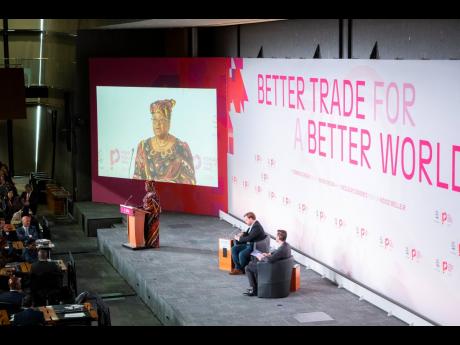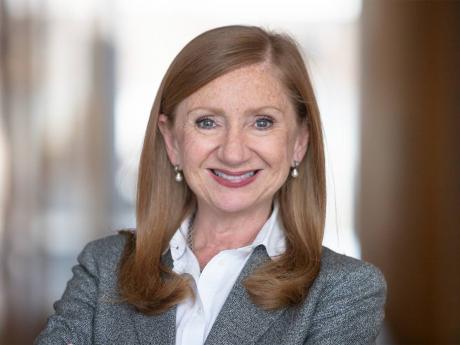Anabel González | Thirty years on: A call to action to restore economic cooperation at the WTO
“Opportunity.” That was the word that Peter Sutherland, the first WTO director general, used to describe the creation of the new global framework to govern trade in goods and services back in 1994. He specifically referred to “opportunities to expand trade, economic growth, and employment … opportunities to promote sustainable development … And an opportunity – the most significant we have had for 50 years – to build a new basis for global economic cooperation”.
Fast-forward to today: the WTO and its rules are still crucial in helping nations to tap into new opportunities for trade growth, to harness trade to tackle global challenges, and de-escalate trade tensions. But amid heightened geopolitical tensions, some key players’ commitment to economic interdependence has waned, chipping away at some of the fundamental principles of global trade governance and making it harder to achieve sustainable economic convergence, particularly for those still at the periphery of economic development – whether they are people, businesses, or entire countries.
Thirty years after the inception of the WTO, it is time to reignite the spirit of economic cooperation that inspired its formation – this time to support so-called re-globalisation to make trade more inclusive and more equitable. Inaction, complacency, or waiting for a sudden change of heart among those unconvinced by the multilateral trade system will not do the trick. Restoring the practice of collaboration among WTO members requires bold measures: first, the role of trade policy as a catalyst for growth and development must be emphasised; second, national-security concerns must be recalibrated; and third, a tangible commitment is needed to rebuild trust among economies and to update the WTO rulebook so that it aligns more closely with today’s realities.
RECLAIMING ROLE OF TRADE POLICY AS A DRIVER OF GROWTH
In today’s world, trade policy can, all too often, be used to achieve domestic goals, including some that may be commendable. However, the effectiveness of using tariffs, subsidies, or other trade policy instruments to achieve geopolitical, climate, or technological objectives is mixed, at best. One thing is clear: making it more difficult to trade does not make goods less costly, and it is mostly consumers, especially the most vulnerable, who end up paying the highest prices. Evidence also confirms that those on the receiving end of trade restrictions rarely remain idle and that tit-for-tat measures may rapidly ensue, leading to a risk of trade conflict.
Over the past 30 years, trade has consistently driven income growth, including in many developing countries. Yet heightened uncertainty and tensions have dampened the expansion of commerce in recent years. Global trade growth in 2024 is projected to be well below average rates in the decades preceding the pandemic. Policymakers must reclaim the role of trade policy as a driver of economic growth, starting by fully utilising the WTO to safeguard openness and certainty in the trading system.
REBALANCING NATIONAL SECURITY AND TRADE
While national security and the increased threats implicit in excessive concentration of production or certain disruptive technologies are a legitimate concern for governments, there is also a risk that increasingly citing national-security risks may distort trade and create trade tensions. Professor Daniel Drezner recently argued that as more items are added to the “national security” basket, the harder it becomes for policymakers to focus on what is truly important in foreign policy, adding that a “rightsizing” of national-security threats is needed. This, in turn, could ease the way to fostering greater transparency and mutual understanding of the rationale and merits of trade measures driven by security concerns.
REFORMING THE WTO FOR TODAY’S WORLD
The WTO needs important reforms to remain effective. One such reform would involve strengthening the disciplines that address trade-distorting policies such as subsidies, including by considering whether special rules might be needed to manage the specificities of different economic systems. Another reform would involve bringing greater flexibility to the way in which the WTO works by facilitating negotiations among groups of economies through plurilateral talks that can later be integrated into the global framework. And yet another reform could promote trade initiatives that are growth-enhancing – a topic especially relevant for developing economies – by supporting green, digital, and inclusive trade. Finally, for greater certainty and predictability in international trade, the WTO’s dispute-settlement system must be restored to full functionality.
FROM GLOBALISATION TO REGLOBALISATION AT THE WTO
Under Peter Sutherland, the WTO became a platform for opportunity through globalisation. Thirty years later, under the leadership of Director-General Ngozi Okonjo-Iweala, the WTO must evolve into a renewed source for opportunity through reglobalisation, ensuring that the benefits of trade reach more people, businesses, and economies, leaving none behind.
Anabel González is an economic development expert. She is currently vice-president for countries at the Inter-American Development Bank. This article was first published in the WTO Blog https://www.wto.org/english/blogs_e/blogs_e.htm. Send feedback to columns@gleanerjm.com.


